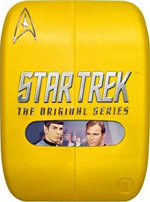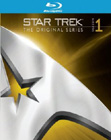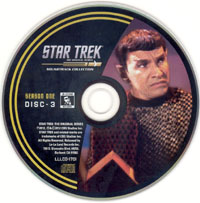Charlie X
Here we are at one of the best episodes of Star Trek's early batch.
There are clear signs here that the concept was probably inspired in part
by Robert A. Heinlein's classic 1961 sci-fi novel "Stranger in a Strange Land"
which would've been fairly new and considered groundbreaking at the time
when this episode was created. The obvious similarities include Charlie's backstory,
the nature of the powers he acquires, and some of the struggles he has
with fitting into Human society.
This story can also be quite easily compared to the series' second pilot
"Where No Man Has Gone Before",
particularly in the challenges faced by the
rest of the crew and how they deal with it. In that sense, I think they
are much more humane and mature with Charlie's case than with Gary Mitchell's,
and do not allow their fears to run away unchecked. And this story is better
for it in the end.
The essential archetypal thread being plucked here boils down to ideas of
parenting. Much of what we get here will be familiar to any generation of parents,
although some of it seems a bit dated and/or contrived to create the next
stage of the drama. Many scenes remind me how much better it is to apply
variations of Stephen Covey's 7 Habits of Highly Effective People, to save yourself
from getting backed into lose/lose control-freak confrontations with any teenager.
But despite its rocky/dated moments, this story is largely a success, and I think
it owes a great deal of its sensitivity and perspective to the fact that the very
excellent writer we have on the final draft is a woman, with the result
that we see sides of our characters that haven't been highlighted as much before
or been given room to breathe. Pretty much all the characters benefit subtly
from this.
Performances are also quite good in this one, beginning with guest star
Robert Walker, and going down through all the members of the regular cast.
William Shatner exhibits a good deal of his range, from the tense stand-offs
with Charlie that beautifully hit the mark, to using his infamously strange
pauses in speech with perfect comic timing to create many nice humorous moments
throughout.
|
Another big plus here is the best musical score of the first season,
as composer Fred Steiner first burst onto the scene of Star Trek.
The music for this episode overflows with fresh passion and harmonic coolness,
and includes some of the most familiar riffs, effects, and melodies on the entire
series as these cues became extremely popular with the music editors responsible
for "tracking" future episodes. In addition to the super-familiar "zap" cues
of which "Zap Sam" is a military-sounding favourite,
we have sneaky little gems like "Card Tricks", the lively bits backing the busy
activity of the crew in "Charlie's Mystery", the wandering strings of
"Kirk is Worried", the tautness of "Standoff", a gentle wistful motif for
Charlie's crush on Janice,
and one of my all-time favourite noble themes "Kirk's Command".
So many of these cues get brought into an episode whenever a sense of
increased urgency is required for a scene whatever its tone may be,
and the music snaps along and works like a charm.
Fred Steiner really outdid himself here.
As much as I like all his scores for Star Trek,
I think his first one here is his best and most original.
|
|
|
Well it seems my least favourite part of the episode is also musical.
Star Trek never seems to know when to leave vocals out of its adventures,
and Nichelle Nichols is left holding the bag this time around. What I can't
quite figure out is whether the episode's creators meant for us to like Uhura's
songs or hate them. The lyrics are absolutely obnoxious, ranging from a
comparison of Spock to a seductive Satan, to taunting Charlie as having an immature
co-dependent status in life. Why set such crap to music, where one person can
one-sidedly hold the floor with nasty comments instead of getting challenged
with two-way conversation? Yeah, I hate these songs, over and above my usual
dislike for vocals. BUT, it still works tremendously well for the story
that we should hate them, because it gets us on board with how Charlie feels,
and has us completely rooting for him during what he does next. Indeed,
when most musical films start up with one of their "numbers", there's often one
castmember shown visibly disagreeing with the main sentiment... someone who
usually doesn't get to respond naturally or properly or - my God - actually
interrupt the song. Charlie pretty much inhabits the great fantasy of what
we musical-haters would love to do - he shuts the singing right down permanently,
giving the singer a bit of sudden laryngitis. Yes! ...And too bad he didn't do
it sooner. Does the director want the audience to feel for him at this point,
or for Uhura and Spock? Or does he just want us to feel, whether for any of
them or for anything else?
At any rate, with Uhura silenced, Fred Steiner takes over once again, and the
difference is like night and day, as excellence reigns once again in the music
department.
This is a totally shipboard episode, and where most others like it usually had
a scene or two on a planet or another vessel, "Charlie X" has nothing but the
Enterprise. We don't even get a model shot of the Antares when the Enterprise
maneuvers to come alongside it. Hmmph. But this story still manages to explore
the culture of the Thasians significantly better than the episode
"The Man Trap"
explored the lost civilization that archaeologist Dr. Crater
and his wife Nancy had been investigating, in spite of all the ruins that were
built on the planet set. Here, Spock and McCoy have another of their nice little
verbal tugs of war over the details of Thasian culture at several points,
until finally at the end both these debates and the main Charlie problem
are put to rest via the nebulous appearance of a Thasian on the bridge.
Cool.
The story's end is quite emotionally strong, stemming primarily from
Robert Walker's moving performance, and then embellished to perfection
by the rest of the cast, the visual effects, the music, and the editing that includes
extending Charlie's last word into a brilliantly haunting prolonged echo.
However, there's no getting around the fact that this is quite a downbeat ending.
Interesting that Uhura and Rand seem quite ready to burst into tears,
while Kirk's only comment is about it all being over... which somehow seems
to be a decidedly male way of looking at the world. It's perhaps unfortunate
that our regular protagonists don't seem to have done anything special or
clever to bring themselves this relief from their current challenges,
and so it's hard to feel that they've learned how to handle parenting any better
for having had this adventure. But how badly do we really need that kind of
action-oriented "final fix" as a criterion in stories we deem "good"?
After all, the helplessness of the human
crew is part of the point that motivates the Thasians' actions here. Still,
I give Kirk a point for briefly going to bat for Charlie in the face of his
judgment from the Thasians. It's not a prolonged speech, but a rather short
inquiry, tempered no doubt by many balancing thoughts about the safety
of his vessel and crew, which is thoroughly appropriate. Perhaps, if the show's
format was not all about returning our regulars to their starting positions
and moving on to something completely unrelated next week, a better long-term
compromise could have been reached to wean Charlie into Human society somewhere...
At any rate, "Charlie X" features pretty much the most moving of all the downbeat
endings on early Star Trek, which keeps it highly satisfying. And this is a very
good and worthy story for Star Trek to tell. But stories would require something
different for Trek to lay claim to the optimism that it is commonly known for.
In production sequence, we've had such episodes already. For the broadcast
sequence, one still had quite a few episodes to go to get to that....
Read the next Star Trek review:
"Balance of Terror"
|
|















